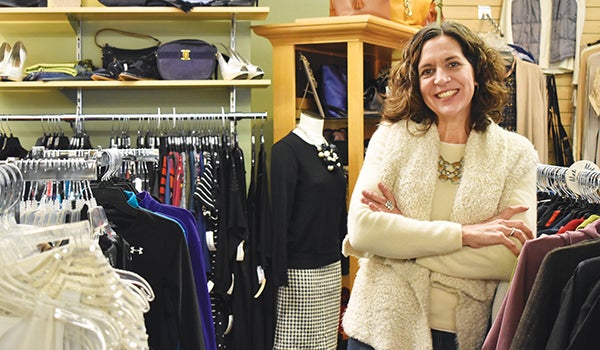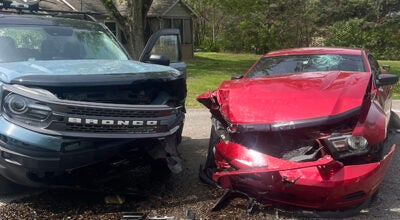Dowagiac store owner believes consignment could help the planet
Published 8:40 am Tuesday, March 3, 2020
DOWAGIAC — When Kris Soenen thinks of the largest polluters in the world, she lists them off in order. Naturally, she starts with energy and carbon emissions. Second, she adds cars and the transportation industry. Third, because she has owned her own consignment shop for the past 13 years, she knows the answer is industry —fashion included.
Soenen, of Dowagiac, opened WHO kNEW? Consignment at 119 S. Front St., Dowagiac, in 2007.
Originally hailing from Chicago, Soenen’s family had been venturing to Big Crooked Lake for many generations. After 10 years of working as a sales expert and in management for Books Are Fun, a division of Reader’s Digest, she opened her own consignment store.
Every day, Soenen sees the impact fashion and clothing have on her customers lives. She also experiences first-hand how consignment and resale can help lessen an environmental footprint.
Standing in between rows and rows of hundreds of pairs of pants, stylish blouses and jackets, Soenen said customers turn to consignment or buy-out right stores like Plato’s Closet because they are looking to not throw out their quality clothing.
“They don’t want to just donate them,” she said. “They are still great clothes, and they want to profit off them.”
At a consignment store like Soenen’s, a person brings in clothes for the store to sell. When the store sells an item, the owner of the clothing earns a percentage of the sale. At Soenen’s shop, customers earn 40 percent.
“They can either shop with credits when they have a balance on their account or they can cash out,” she said. “My business puts money back into the community every single day.”
Stationed in downtown Dowagiac, Soenen said consignment can also help the local economy as money goes back into customers’ pockets, who then could visit a restaurant across the street or fill up their tank at the nearest gas station.
As consignment proves to help one’s personal and local economy, it can also have an impact on the environment.
“It lessens the impact on our landfills,” Soenen said. “Clothes are being used again and again and again, hopefully until they are worn out like they did back in the day.”
One garbage truck of clothes is burned or sent to landfills every second, according to an article by the World Resource Institute.
Sitting in a back office away from the thousands of articles of clothing outside an office door, Soenen said by shopping resale or consignment, customers are also lessening the consumerism of new fashion or fast fashion trends. Purchasing used clothing decreases demand for new clothing.
The average consumer bought 60 percent more clothes in 2014 than in 2000, but kept each garment for half as long, according to the same article by the World Resource Institute.
Soenen said people seem immune to how often fast fashion can make shoppers feel the need to flip their closets.
“We need that cheap T-shirt, and then we need that one next, and then we won’t even wear it,” she said.
Even with Soenen’s 4,000 square foot store, she still does not have the capacity to accept every donation. However, she ensures items’ next stop is never a landfill.
When a piece is brought in, tagged and put out on the floor, it is contracted through a 90-day period.
“We have a very high sell through rate, so there is not a lot that gets donated to other organizations, compared to what we do take in,” Soenen said. “The pieces that we do take in that are quality and don’t sell still get donated on and serve the community.”
Soenen said her store attracts all ages interested in shopping resale — from teenagers to the elderly. However, she feels younger generations are slower to shop resale if their families traditionally never did.
“There is a perception that used isn’t good enough or used is out of style, which isn’t true, depending on where you are shopping. Used basically just saves you money. Once you wear anything once, it’s considered ‘used.’”
Soenen mentioned how Anna Wintour, the Vogue U.S. editor-in-chief, called for more sustainability in fashion last year at a fashion conference in Athens, Greece.
“The fashion industry is paying attention now to their impact and to have [Wintour] pushing the boundaries and how they manufacture is huge,” Soenen said.
Inside the consignment shop, a jean jacket lined with fur, a children’s two-piece outfit with a bright pattern or a black pressed blazer could become someone’s future favorite piece of fashion. The possibilities are endless.
“The whole resale impact is a lot bigger than just WHO kNEW? Consignment,” Soenen said.







